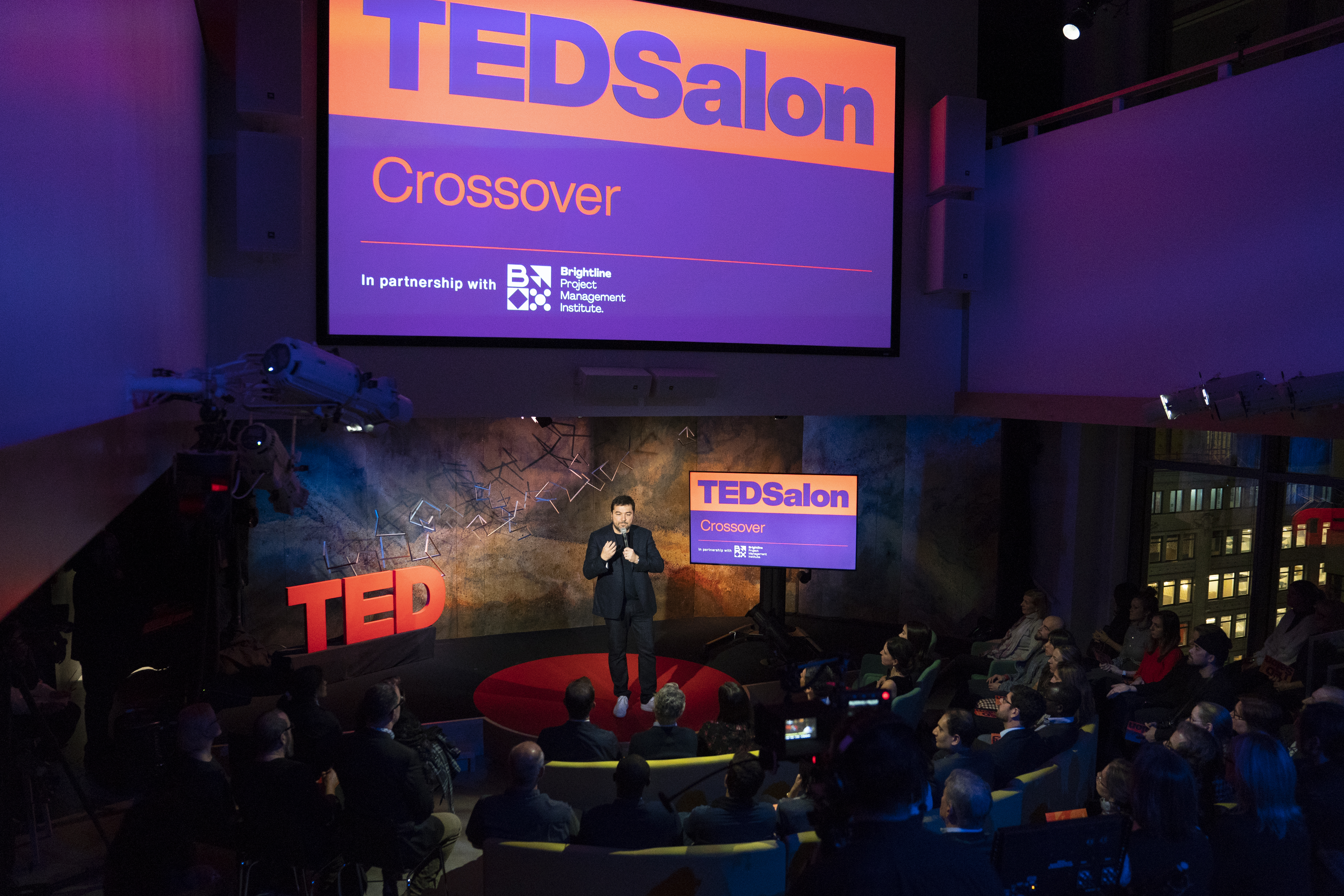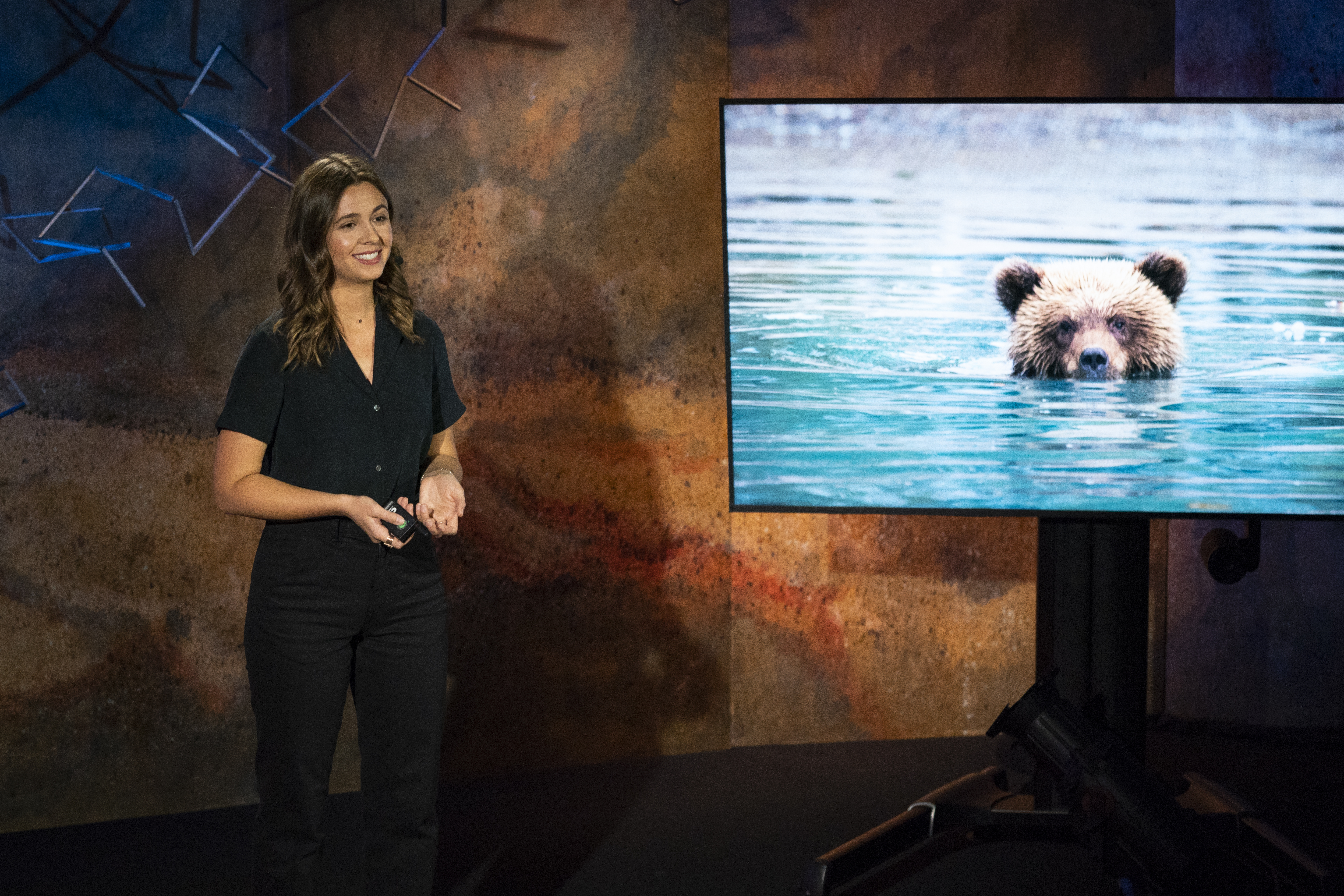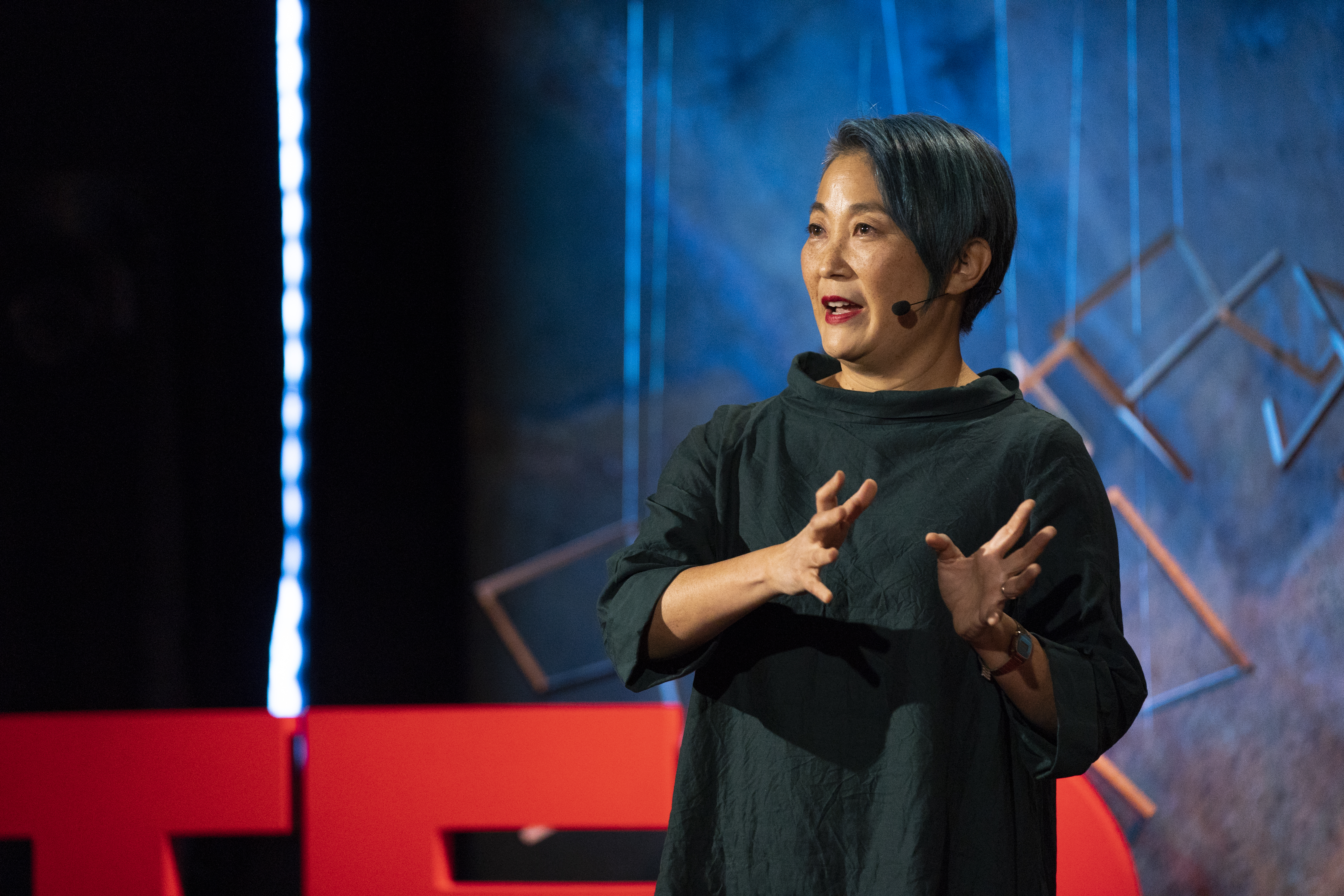
Ricardo Vargas, executive director of the Brightline, welcomes the audience to TED Salon: Crossover — a night of talks about how we can collaborate, share and learn from each other. (Photo: Jasmina Tomic / TED)
To crossover is to fully embrace what complements us, to find insight and illumination from a style or field adjacent to our own. When fully achieved, it allows us to become greater than the sum of our parts. In this evening of talks, five speakers and one musician shared their own experiences of crossing over to achieve heightened levels of success.
The event: TED Salon: Crossover, hosted by TED’s Crawford Hunt and Alex Moura
When and where: Thursday, November 14, 2019, at the TED World Theater in New York City
The partner: Brightline, with Brightline executive director Ricardo Vargas warming up the audience with opening remarks
Music: Meg Myers, blending confessional lyrics with emotional rock
The talks in brief:

“Photography can be part of a beautiful experience. Just don’t let it be a block between you and reality,” says photographer Erin Sullivan (Photo: Jasmina Tomic / TED)
Erin Sullivan, photographer
Big idea: Taking photos as a social obligation — in order to share them on Facebook or Instagram — stands in the way of how we relate to nature and other cultures.
Why? We’ve all vacationed to places overrun by camera-toting tourists, and we’ve probably all wondered: Does taking — and, of course, sharing — photos of stunning scenery change our experience? In our fever for documentation, are we missing out on a deeper relationship with our environment? Although at least one study has shown that taking photos solely for ourselves can enhance a traveler’s experience, Erin Sullivan believes questioning our true purpose every time we pull out a phone or a camera might lead us to put it away — and experience singular, beautiful moments as they happen.
Quote of the talk: “Photography can be part of a beautiful experience. Just don’t let it be a block between you and reality. Be intentional. And don’t lose a beautiful, irreplaceable memory because you were too focused on getting the shot.”
Jinha Lee, reality designer
Big idea: An augmented-reality meeting platform that helps coworkers around the world brainstorm and build together in a shared virtual “office.”
How? Remote working has become an everyday reality, yet most distant coworkers still find themselves stuck in front of a confining screen. With Spatial, Jinha Lee’s augmented-reality meeting platform, a headset-wearing user creates a digital avatar that mimics their every movement, from the direction of their gaze to the motion of their mouse. They then “teleport” these digital avatars into a shared AR space, where fellow users can share their screens, create notes from spoken phrases, organize them and play with them — resulting in a meeting experience blending elements of virtual and physical spaces.
Quote of the talk: “Reducing distance between computers and us can reduce the physical distance between people — and I hope it eventually shortens the distance between people’s minds and dreams.”
Cornelia Geppert, artist and video game maker
Big idea: A video game that shows us we’re not alone in our loneliness — and how we can overcome our biggest monsters.
How: When artist Cornelia Geppert felt the overwhelming crush of loneliness, she channeled her emotions to create a new video game called Sea of Solitude. An adventure brimming with stunning visuals, gamers play as Kay, a young woman in danger of drowning in a world quickly flooding with her own tears. To turn the tide, you must navigate Kay’s feelings of loneliness by managing her relationships and overcoming her monsters, Self-Doubt and Self-Destruction. As you guide her, you just may learn how to face your own struggles and embrace your own difficult emotions.
Quote: “Our monsters appear huge and scary, but if you overcome your reluctance and approach them you soon see that they are no monsters at all, but fragile beings that are simply overwhelmed by what life throws at them.”

Digital culturist Lisa Nakamura shares her vision for creating a new kind of internet. She speaks at TED Salon: Crossover, in partnership with the Brightline. (Photo: Jasmina Tomic / TED)
Lisa Nakamura, digital culturist
Big idea: The internet is a trash fire. Let’s work together to make it better.
How? We need to acknowledge that the internet is real life, not a place removed from our day-to-day. It’s where people make money, communicate with one another and can learn anything — including toxic behavior, says Lisa Nakamura. She offers a set of solutions that all citizens of the internet and gaming communities can be a part of, in order to right the wrongs we’ve lived with for too long: catcalling, racism, cruelty, personal attacks. She suggests we reacquaint ourselves with the flagging and reporting tools available now, stop letting the internet raise our children, cultivate a culture of compassion around past egregious behavior and ultimately insist on alternative platforms that allow us to start fresh. By taking these steps in earnest, Nakamura believes we may have a fighting chance to heal some parts of our digital world.
Quote of the talk: “The internet’s been run by the wrong kind of people for a long time. If we envision a different future, if we work together to include everybody, we can create a new kind of internet.”
Guy Winch, psychologist, author
Big Idea: Endlessly thinking about work during your downtime is stressful, unproductive and leads to burn out. If you avoid these ruminations, you’ll be happier in your personal life and more fulfilled at work.
How? Stressing about work doesn’t just happen when you’re working — it happens when you’re trying to relax and recharge too, says Guy Winch. And this type of rumination can be harmful: the more you worry about a deadline or an email draft, for instance, the more likely you are to sleep badly, eat unhealthy foods and have worse moods. Fortunately, by following a few rules, Winch shows how you can vanquish intrusive post-work anxieties for good. First, set clear and strict boundaries: when your workday is over, commit to turning off work reminders and actively participate in whatever you’re doing next. Next, when ruminative thoughts do appear, translate them into resolvable problems. (For example, “I have so much work to do” can become “What can I move in my schedule to finish that task?”) If you can stop ruminating on your job, you’ll be more engaged and motivated at work — and able to more fully enjoy your time off, too.
Quote of the talk: “Ground zero for creating a healthy work-life balance is not in the real world — it’s in our head. If you want to reduce your stress and improve your quality of life, you don’t necessarily have to change your hours or your job. You just have to change how you think.”